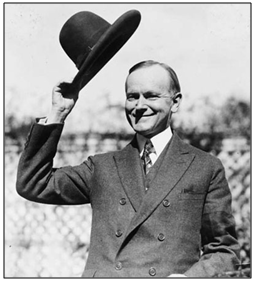By David Bozeman
With private industry under federal ownership, trillion dollar budget deficits and American leadership floundering under arrogance and hubris, Americans would do well to heed the legacy of our nation’s 30th president, who was born on July 4, 1872.
Unfortunately, conservatives are either unaware of Calvin Coolidge or would rather avoid him as a subject, perhaps because his presidency ended just months before the stock market crash of ’29. The progressive Teddy Roosevelt is considered a much safer choice to stand with Ronald Reagan as the 20th Century’s best Republican presidents.
Coolidge is rated by historians as, at best, mediocre, and somehow the march of time has left his memory behind in the midst of a quaint, bygone era. The socially awkward country lawyer — who looked like he’d been weaned on a pickle (attributed to Alice Roosevelt Longworth) — is usually considered about as timeless as speakeasies and silent movies.
Or maybe not. Syndicated columnist Cal Thomas says it’s about time Calvin Coolidge got another look. The late Bob Novak concurred: “I only wish we had him around for the 21st Century.” Like Ronald Reagan nearly 60 years later, who hung Silent Cal’s portrait in the Cabinet Room of the White House, Coolidge presided over an era of unprecedented peace and prosperity.
Top income tax rates, set during World War I, hovered in the 70s, so Coolidge, like Warren Harding before him and with a Republican Congress, lowered them to about 25 percent, not out of mere pragmatism but out of principle. “I want the American people to work less for the government and more for themselves,” said Coolidge. “I want them to have the rewards of their own industry. This is the chief meaning of freedom.”
With the same frugality that defined his tough, rural Vermont upbringing, the Coolidge Administration employed thrift in balancing the federal budget, including a controversial stand against a veteran’s bonus. Nonetheless, the 1924 budget, the smallest since before the war, was a source of pride for the administration. He also exhibited restraint in the exercise of power.
Again, Coolidge’s spare, modest approach to public service was borne of an abiding respect for goodness, simplicity and hard work as America’s best and most defining characteristics, all stemming from an implacable faith in God. “Our government rests upon religion,” Coolidge declared. “It is from that source that we derive our reverence for truth and justice, for equality and liberty, and for the rights of mankind…”
Coolidge left the U.S. mostly peaceful and prosperous — much work was needed in the area of social justice, particularly civil rights, though he supported women’s suffrage, limited funding for welfare and measures to improve workplace safety.
The stock market crashed roughly six months after he left office. Though some modern historians (such as Thomas E. Wood, Jr., author of The Politically Incorrect Guide to American History) note that the Great Depression was caused by the over-corrective measures of the Hoover and Roosevelt Administrations, Coolidge is forgotten and dismissed not for just for the hardships of the 30s but for who he was.
A quick perusal of presidential reference books will show that Coolidge, like Republican presidents to follow, was dismissed both as a commoner in over his head and as a shill for the rich. In fact, like his reputation, his most memorable quote has been twisted beyond all recognition. In 1925, he did say to the American Society of Newspaper Editors that “the chief business of the American people is business.” Critics have turned that remark against him, though he was speaking in a very limited context and he consistently noted that national wealth was but a means to an end, always stressing the importance of character as a public virtue.
Said Coolidge, “The accumulation of wealth means the multiplication of schools, the increase of knowledge, the dissemination of intelligence, the encouragement of science, the broadening of outlook, the expansion of liberty, the widening of culture.”
Presidential historians, mostly liberals, dote on the intellectual bravado of Woodrow Wilson and FDR — indeed, snobbery has never been predicated solely on material or social status (though FDR enjoyed both) — a supposedly superior mind is reason enough for liberals to roll their eyes at average folks.
But to argue that Coolidge was smart — he was an avid history buff — misses the point. He was good, simple and honest, and to America in 1924, that was enough.
From the perspective of presidential history, he is the un-Obama, plain in appearance, simple in style and taste and spare with his words. He built his presidency on his faith in the American people, who, in turn, were richly rewarded. He embodied substance over style, deeds over words (“Let men in office substitute the midnight oil for the limelight.”) and humility over self-aggrandizement. Talk about audacity!
Conservatives today ask what Ronald Reagan would do, but Reagan had his own shining example in Silent Cal. Perhaps President Obama could glean a little wisdom from our 30th president who remarked, just before his death, that common sense and hard work are the real solvents for the nation’s problems.
Author’s note: Kudos to the Calvin Coolidge Memorial Foundation (calvin-coolidge.org). Also, a treasure trove of Coolidge quotes are available in The Quotable Calvin Coolidge, compiled and edited by Peter Hannaford, Images from the Past Publishers, 2001.
David Bozeman, former Libertarian Party Chairman, is a Liberty Features Syndicated writer for Americans for Limited Government.


